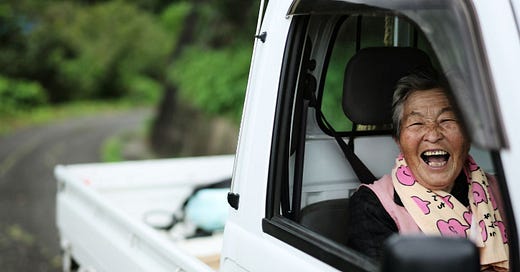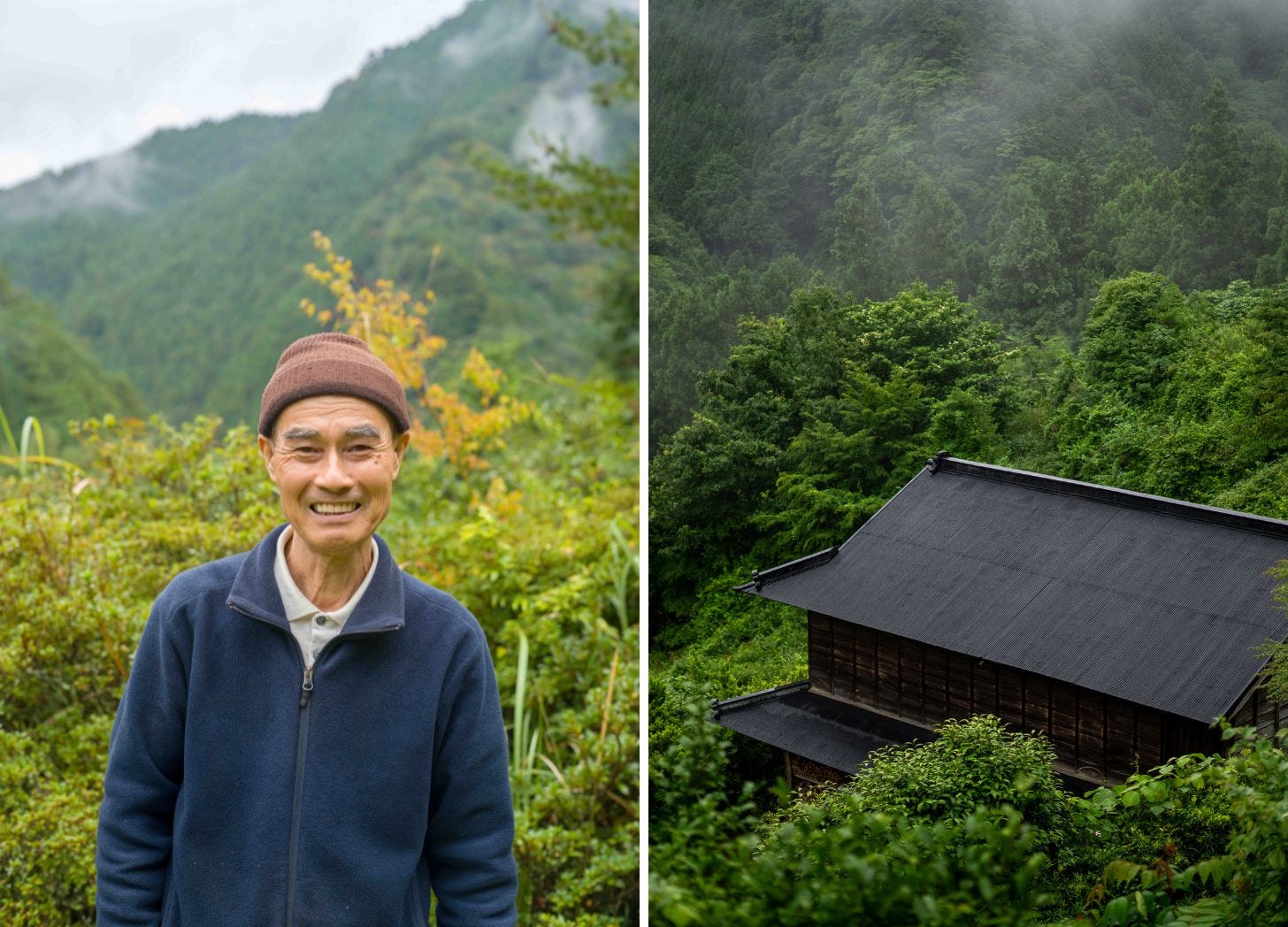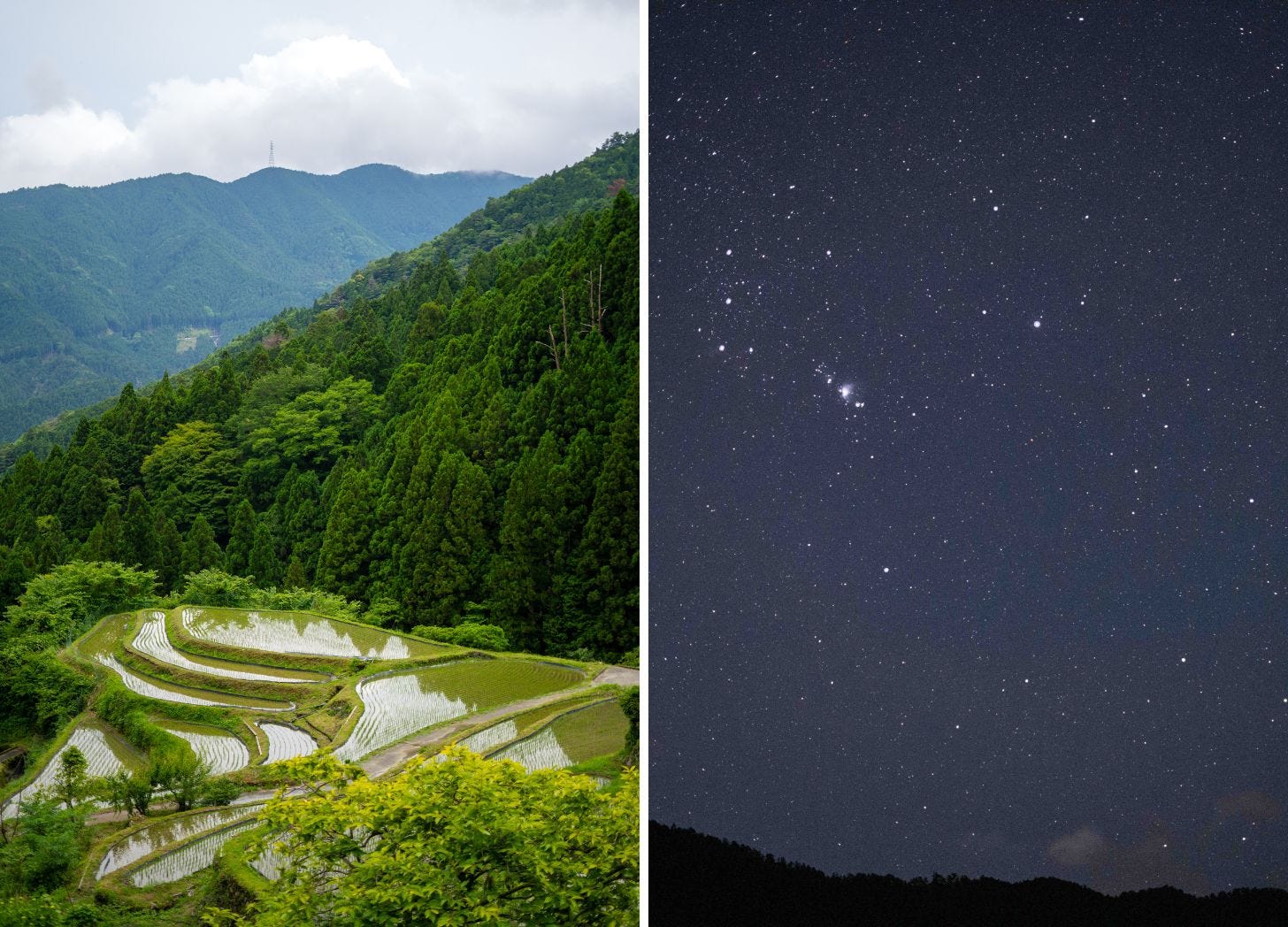Shiwa-Shiwa: A Japanese Vocabulary for Slow Living
Japanese Words You've Likely Never Heard Of
For those who are new here, welcome, dear reader. And for those returning, thank you for coming back. This post is a little different from my usual ones.
I usually write vignettes of daily life that capture a season or an activity — painting a broader picture of what it’s like to live in the Japanese countryside. But today I want to reflect on language, specifically my relationship with Japanese, and how certain words can reveal the culture.
I was born and raised in Canada. My mom is Japanese and left Japan during her final year of high school to study abroad. My parents immigrated to Canada before I was born. As they adjusted to a country foreign to them, I grew up forming an identity that was connected yet separate from theirs.
Even though I’ve made huge strides in my Japanese since moving to Japan, fluency still feels distant, and sometimes I feel like an imposter in the language. I understand words, but sometimes I feel like I understand them only cognitively, not emotionally. Aren’t words meant to be felt to be fully understood?
Japanese isn’t a language where knowing the words alone means you can communicate well. I think all languages are like that, but somehow the Japanese language feels so much more embedded into the “Japanese” identity — probably because certain words can encompass a whole worldview.
Does English have something like that? Why does English feel like a descriptive language more than one about identity? There is also so much unsaid in Japanese, so it can also be confusing and isolating for those on the outside.
When I moved to Japan I knew my vocabulary was limited, but I didn’t realize how much I didn’t know. It was very, very humbling. There are so many words tied to a landscape, spoken in the context of place, that without living has no meaning.
So, dear reader, I’d like to share some of the words I’ve gathered over the years in the Japanese countryside. Lists can be lovely, but like all translations, they lose something outside of their context. I’ll include a rough translation based on my understanding, and then a short reflection from my own experience. Likely other Japanese speakers will find it has a different nuance or interpretation. Words take shape from how we live and what we notice. I hope these ones offer you a window into some of the things I see.
Inaka (田舎、いなか): A rural place that conjures more than just geography. Likely its landscape is of mountains, but maybe ocean — nature envelopes the image of the inaka. It evokes a slower pace, strong community ties, and traditional ways of life. Self-sufficiency is something to strive for, using our hands as tools to do the things that money, in any other city context, could fix so easily. It’s embracing friction and inconvenience, even welcoming it, because there is something to be gained in this struggle. There is something nostalgic about the word inaka — a yearning for a hometown and a place where your grandparents grew up. A time when knowing your neighbours was a given and hard work on the farm was required of your rite of passage into adolescence.
Self-sufficiency is something to strive for, using our hands as tools to do the things that money, in any other city context, could fix so easily. It’s embracing friction and inconvenience, even welcoming it, because there is something to be gained in this struggle.
Satoyama (里山、さとやま): There is a physical place, a boundary zone, where people and nature co-exist. This concept is tied with the idea that humans need nature and certain ecosystems can thrive with human care. It’s a very different idea from Western conservation that often designated protected areas — rather, satoyama is not a conversation method but rather a lifestyle that recognizes there are places where people live in and with nature. The rice field is one of the easiest landscapes to understand because when you maintain a rice field, frogs and other creates create a home in the spaces between the rocks and in the paddy fields. Satoyama is a place where the cycle of nature and human activities intertwine.
Hyakushō (百姓、ひゃくしょう): This word was traditionally used to describe farmers or those whose primary work was agriculture. Hyaku means 100 and it describes the wide range of (100+) skills that people had at that time. The definition of hyakusho has expanded to include people who see the benefits of having such a wide range of skills that are helpful in living in the countryside. Each month, there’s a local organization that organizes hyakushō no hi (farmer's day), where locals participate in activities like foraging for wild vegetable, harvesting millet, pickling radish, making tools with bamboo and straw.
Kufū (工夫 、くふう): A close translation might be ingenuity or devising a way to figure out something creatively. It’s a wonderful word that’s not about solving a large or complex problem, but finding ways to make do in environments where resources are limited. I learned this word from someone who lives in my village. He’s a 70+ year old artist and craftsperson who values doing things with his own hands. He lives sustainability by being conscious about his consumption and waste; he embodies a circular and intentional way of living. In rural life, we work with what we have and adaptive maneuvering is kufū.
Temagai (手間替え てまがえ): In rural areas, people share the labour and help each other out. I’ve written about this shared labour often — from thatching the roof to maintaining a shared water source. Before the onset of mechanisation, many people spent a lot of time supporting the lives of those around them, rather than working for themselves. By working together, families can complete a task much more efficiently. Acts of service were paid in kind and reciprocated over time. Temagai reflects this exchange and it’s an important element of deepening ties within a community.
Yutori (ゆとり): This was my word of 2025! This is a noun that means having room to spare, not being cramped. Room to breathe. Rest. At its core, yutori translates to "spaciousness", and the concept extends beyond physical space, encompassing mental and emotional space as well. The word yutori has taken on special significance for me during my years in Kamikatsu. It’s a term I often hear when talking about happiness and a "good life" with others. But yutori is more than its translated meaning — it’s a feeling, a moment, a connection to the scenery around me. I think of standing amidst the mountain landscape, gazing at the terraced rice fields, watching long blades of grass sway like ocean waves in the wind — in those moments, we would say, yutori (or to have yutori ゆとりがある).
‘Yutori’ is a noun that means having room to spare, not being cramped. Room to breathe. Rest. At its core, ‘yutori’ translates to spaciousness, and the concept extends beyond physical space, encompassing mental and emotional space as well.
Mottainai (もったいない): Perhaps the one word on this list you’ve already heard! Mottainai is often translated as “waste not” or “what a waste.” It has many meaningful applications, but in daily life, it’s also said lightly when something isn’t utilized to its full potential. Over 20 years ago, our village made a bold commitment to recycle everything generated at the household level and try to divert all waste from landfills and incineration. Kamikatsu became known worldwide as Japan’s first “zero waste” village. This connects to the word mottainai because when you start seeing things through mottainai, you begin to realize just how much can be reused, repaired, or repurposed.
Komorebi (木漏れ日): Have you ever walked beneath a tree and opened your palm to watch shifting patterns of light and shadow dance across your skin and the ground below? That light that filters through the trees is komorebi. Like mottainai, this word is often used quite simply, but living in the countryside, where daily walks bring me so close to this kind of (often unnoticed) beauty, I can’t help but feel moved that a word like this exists. Look up, look down, look all around you at the light and shadows.
Kurashi (暮らし、くらし): The word kurashi refers to a “way of life.” But it’s more than a set of lifestyle choices — it reflects a deeper orientation toward time, values, and relationships. To understand kurashi is to rethink how we relate to people and places. While the countryside is often seen as static or unchanging (or worse, as lagging behind), a growing number of young people are arriving not to consume a lifestyle, but to co-create kurashi (a way of living) rooted in care, reciprocity, and place.
Shiwa shiwa (しわしわ): Tokushima prefecture is located on Shikoku Island — a much less travelled to part of Japan. Once known as the Awa Kingdom, the region still carries traces of its former name: you’ll see “Awa” as a prefix to many things from festivals (Awa Odori), foods, and the local dialect known as Awa-ben. The dialect is spoken widely in my village, especially by elderly people. When I first heard Awa ben I wasn’t sure I was listening to Japanese. I grew up hearing only standard Japanese and I wasn’t used to this different cadence. One of the first words I learned was shiwa shiwa which means slowly or without rushing. Shiwashiwa ikinayo means go slowly, but we also say ‘look at it slowly’, ‘drink it slowly’, or ‘think about it slowly’. The word means slowly, but it’s so cute the way it rolls off the tongue, shiwa shiwa, I imagine the grandmas who tell me to slow down. My energy and need to hurry being nudged to put a foot on the break… it’s the countryside afterall and what’s the hurry?
One of the first words I learned was shiwa shiwa which means slowly or without rushing. ‘Shiwashiwa ikinayo’ means go slowly, but we also say ‘look at it slowly’, ‘drink it slowly’, or ‘think about it slowly’.
I actually had a much longer list!! I realized I could have written an entire essay on just one word. But I think there’s something special about seeing these words side by side… somehow they flow together, and it makes me happy to give them a place here. I hope you enjoyed reading, and if you're curious about more words, I have plenty more to share. I’d love to hear what you thought.
Have a lovely start to the week. Hang on like this lil lady bug!
Kana












Thank you for this. I live in rural Japan as well (up in Miyagi). My Japanese language skills are atrocious, but I am trying. Your substack is an inspiration. I am crashing and burning in my life right now and I take comfort from the simple life you write about. Thank you.
Thank you, I miss my dream Japan from my life. But I was many country. Thailand, Hong Kong, Philippines 8 years. Aikido gave me some more words in my country, Hungary.
Japan is staying my dream...